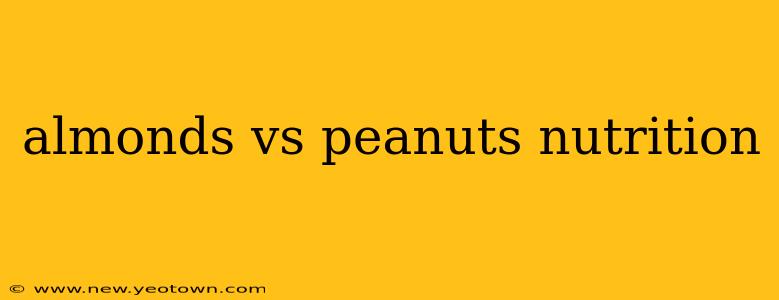The crunchy, satisfying snack—whether it's almonds or peanuts—is a common sight in pantries worldwide. But when it comes to nutrition, how do these popular nuts stack up against each other? This isn't just a battle of taste; it's a nutritional face-off that could influence your health choices. Let's delve into the specifics and uncover which nut reigns supreme in various nutritional categories.
What are the main nutritional differences between almonds and peanuts?
This is a question at the heart of this comparison. Both almonds and peanuts offer a wealth of nutrients, but their profiles differ significantly. Almonds generally boast a higher concentration of certain vitamins and minerals, while peanuts pack a bigger punch in terms of protein and certain other vitamins. Thinking of it like a sports game, almonds might excel in agility (vitamins and minerals), while peanuts are powerhouses of strength (protein). The real winner depends on your individual nutritional needs and goals.
Are almonds healthier than peanuts?
The "healthier" nut isn't a simple yes or no answer. It's more nuanced than that. Almonds tend to edge out peanuts in some areas, like vitamin E content, which is a potent antioxidant. They also offer more magnesium, crucial for muscle function and blood sugar control. However, peanuts provide more protein, which is essential for building and repairing tissues. Ultimately, both contribute positively to a balanced diet, and the "better" choice depends on your individual nutritional priorities.
Which nut has more protein?
Peanuts win this round, hands down. A serving of peanuts contains significantly more protein than an equivalent serving of almonds. This makes peanuts a more appealing choice for individuals focusing on building muscle mass or increasing their protein intake. While almonds do contribute protein, peanuts are the clear champion in this category.
Which nut has more fiber?
Both almonds and peanuts are decent sources of fiber, but almonds generally contain slightly more. Fiber is crucial for digestive health and can help regulate blood sugar levels. This subtle difference, however, doesn't dramatically alter the overall fiber contribution from either nut.
Which nut has more healthy fats?
Both almonds and peanuts are rich in healthy fats, specifically unsaturated fats, which are beneficial for heart health. While the types of fats are quite similar, the proportions differ slightly. The overall impact on health is comparable, although both contribute significantly to your daily healthy fat intake.
Which nut is better for weight loss?
Neither nut is inherently "better" for weight loss. Both are calorie-dense, meaning a small serving can provide a substantial amount of energy. However, the healthy fats and fiber in both can contribute to satiety, helping you feel fuller for longer, potentially aiding in weight management when consumed as part of a balanced diet. Moderation is key with both almonds and peanuts.
Are almonds or peanuts better for diabetics?
Both nuts can be part of a diabetic-friendly diet when consumed in moderation. However, almonds may have a slight edge due to their higher fiber content, which helps regulate blood sugar levels. Always consult with a healthcare professional or registered dietitian for personalized dietary advice, especially if you have diabetes.
Conclusion: The Nutritional Tie
The "Almonds vs. Peanuts" nutritional battle doesn't have a clear winner. Both are nutritional powerhouses offering valuable vitamins, minerals, healthy fats, and fiber. The best choice depends on your specific dietary needs and preferences. Including both in a varied and balanced diet is an excellent way to reap the benefits of each. Remember, moderation is key for both!

